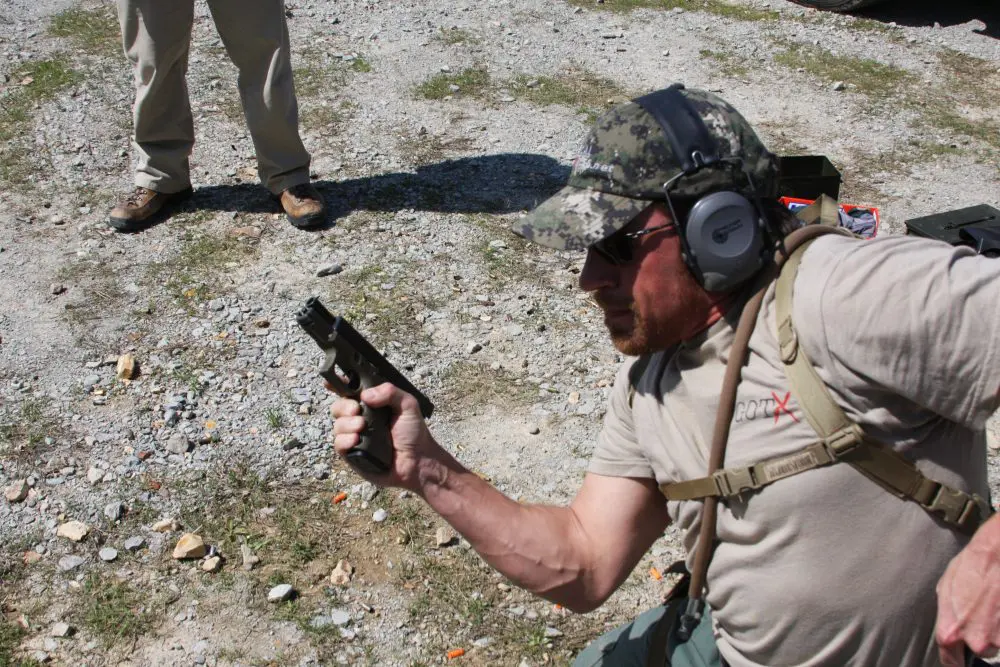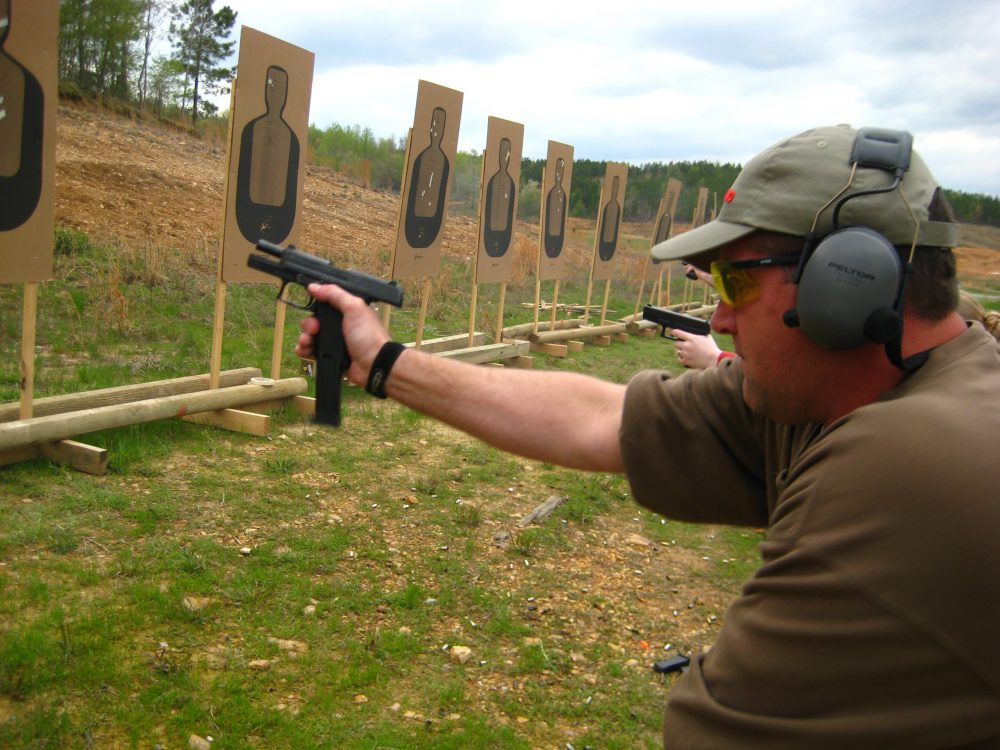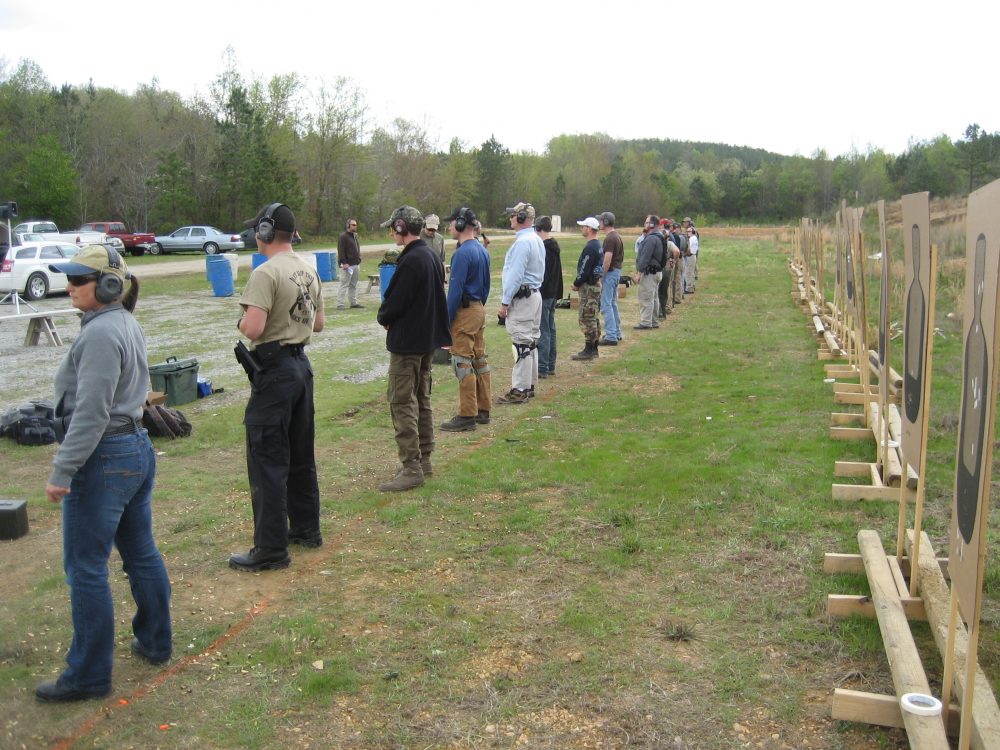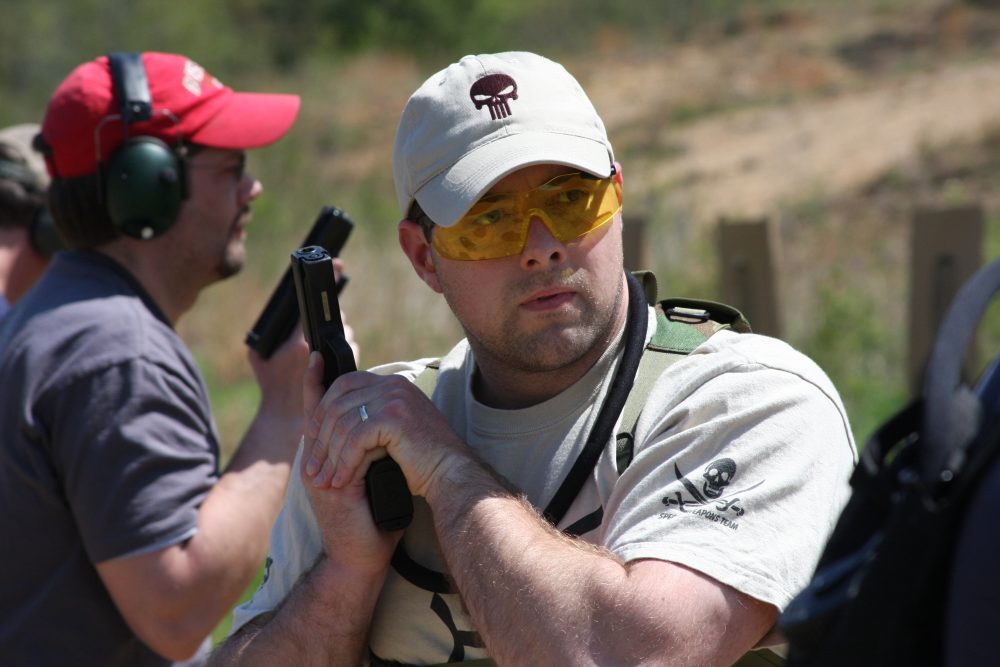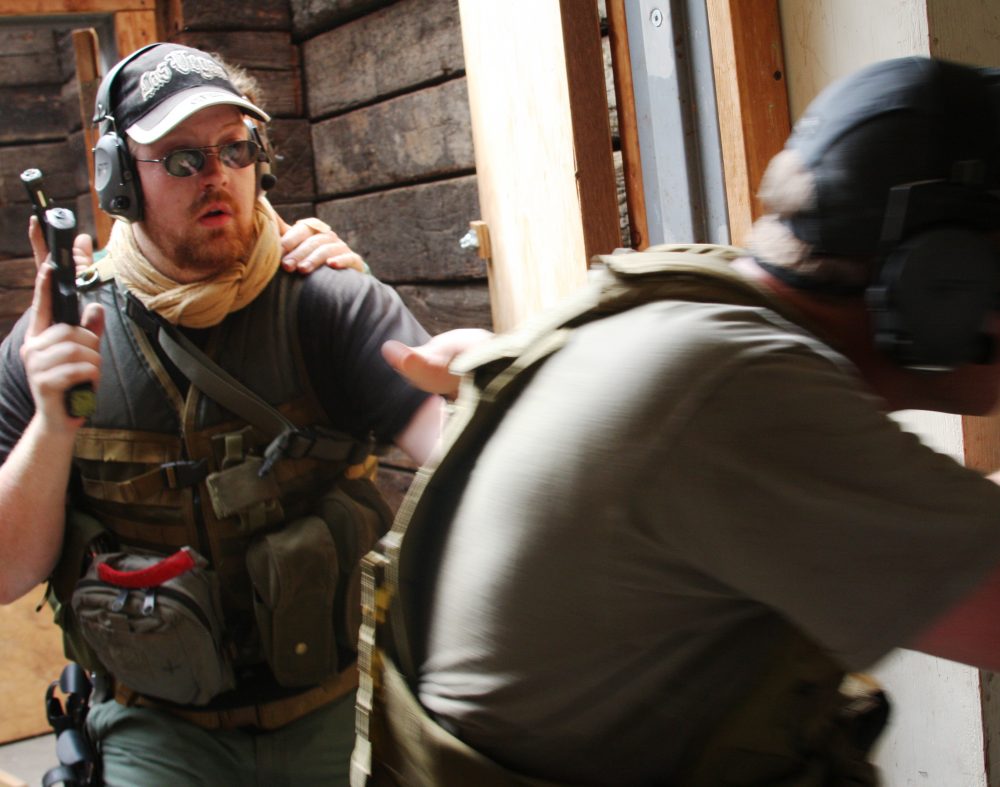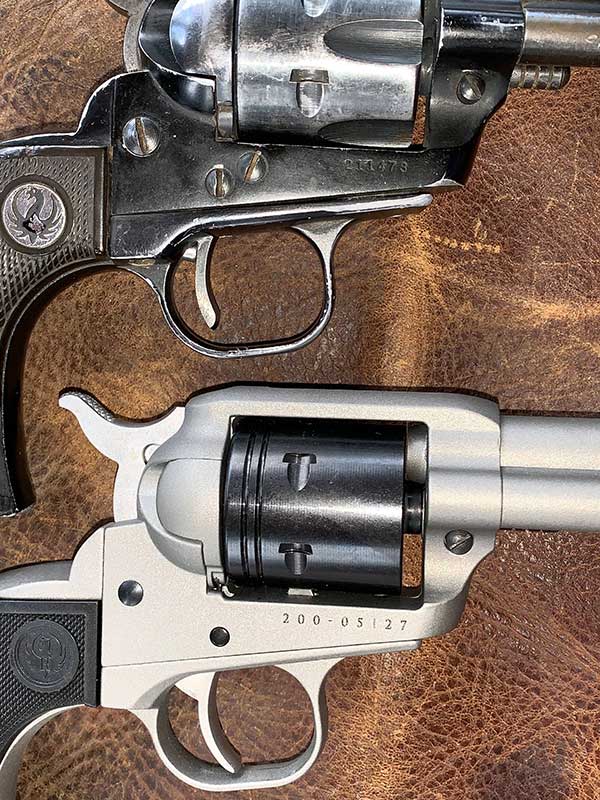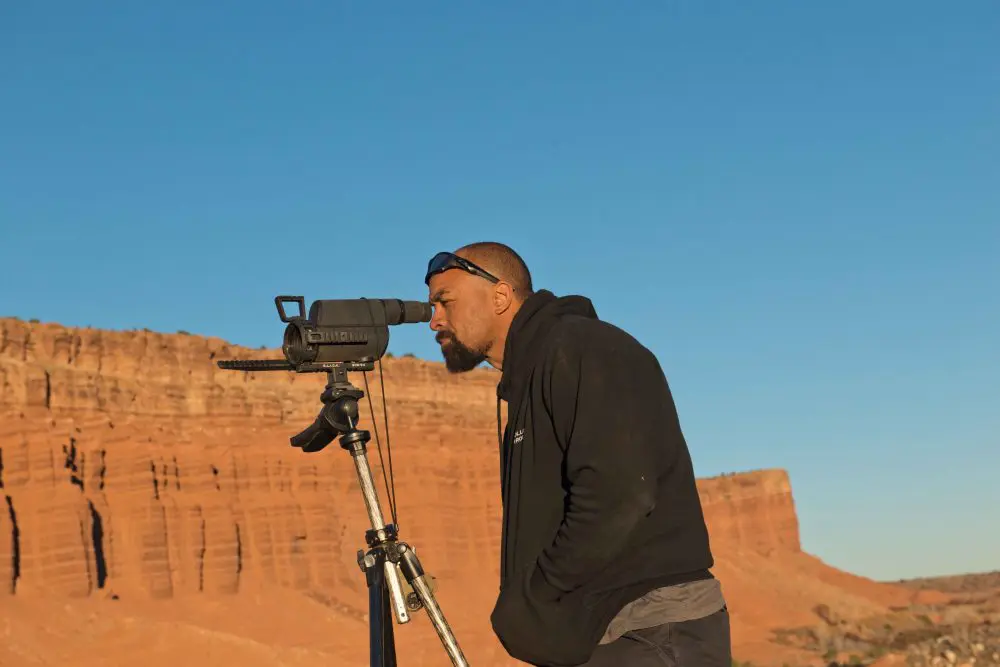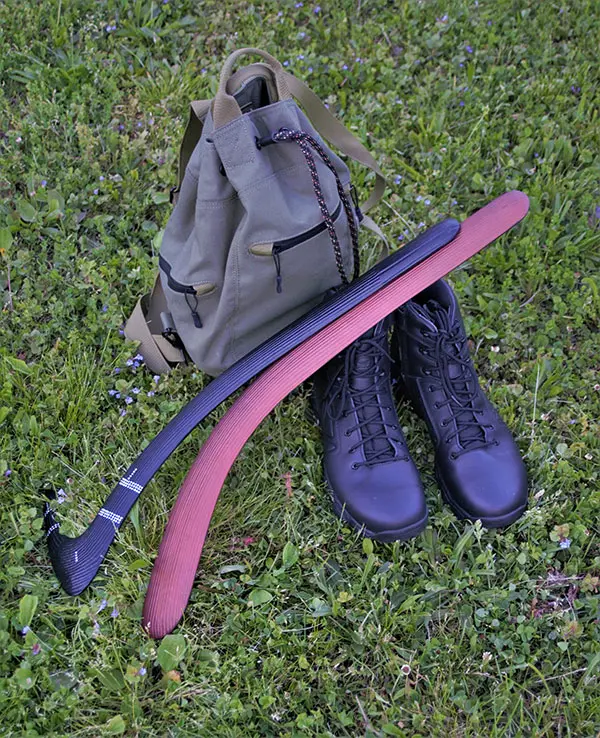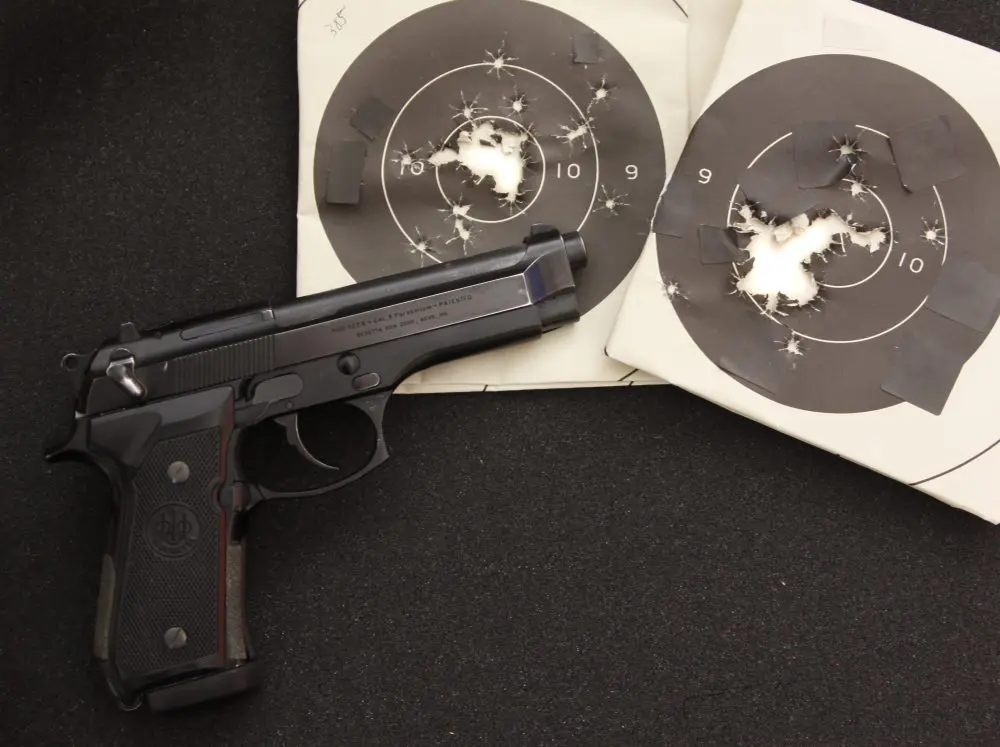Here we are in the year 2008 and, except for small pockets of reality, we, as tactical trainers and shooters, really haven’t progressed very far in the last 20 years. What is it about us as teachers and students that cements our position? What is it about us gunmen that makes us so unwilling to change? The Earth is not flat and the world we fight in isn’t 180 degrees either.
Maybe you’re thinking, “What is Yeager talking about now!?” Well, I want to discuss firearms training and our unwillingness as trainers to change our curriculum. I believe that some of the things we do are counter-intuitive, that we are ingraining potentially deadly habits in our students and in some cases are making our students unlearn positive things.
NRA/ILA lobbyist Darren LaSorte grabs a fresh mag before he jettisons the empty. Grabbing the fresh mag is an important step in any reload, to insure you haven’t shot it already or lost it rolling on the ground fighting. This is done for all reloads to streamline the thought process under stress.
Why do we hold onto some very outdated training practices? Just because some tactic or technique is old doesn’t mean that it no longer works. If nothing “big” in your program has changed in the last five years, are you really being progressive? I don’t know any tactical training school or police department in the U.S. that teaches to put your off hand in your pocket and blade sideways to the target and fire one handed. That was state of the art at one time and now we giggle when we see the old photos. I am not saying to change for the sake of change, but I am saying that evolution is reality.
There is a story about a young couple preparing their first Christmas dinner. The wife cuts off the end of the ham before putting it in the oven. The husband asks why and the wife explains because her mother taught her to do it. The mother shows up for dinner and the son-in-law asks why she cut off the end of the ham and her reply was the same. She had cut it off because her mother had. A phone call to the grandmother (and why wasn’t grandma invited to Christmas dinner?) reveals the reason. Grandmother cut off the end of the Christmas ham because it wouldn’t fit into her roasting pan. Her daughter and granddaughter just did what they were taught and never questioned it.
Letting empty mags hit the ground, instead of putting them in a pocket, speeds up the reload tremendously.
We do that as instructors too. Teaching something just because you were taught it isn’t good enough. We must know why we are teaching it. We must also know why we are not teaching certain techniques or tactics. Looking for a different way is not the path. We must look for a better way and when we find it we must be humble enough to change what we are currently doing.
If we are not teaching a particular tactic or technique, we should know why it is inferior. An example of something not to teach comes from the valuable lessons we learned from the Newhall, California massacre of four Highway Patrol Officers. The officers were told during qualification to put the empty brass in their pockets. This was done to speed clean-up on the range. The officers were supposed to skip that step in a gunfight but they “reverted to their training.” You cannot do halfhearted training and then simply hope it will work. “Hoping” you will revert to your training is dangerous. It is especially dangerous if the training you revert to is substandard.
Starting students from various positions, even with their back to the target, is a safe and effective practice. Even if you have a “square range,” you can use all four sides.
You will not rise to the occasion.
You will not default to your level of training.
You will only default to the level of training you have mastered.
In nearly every class I teach, I have to correct a student for taking the time to put empty magazines in his pockets. If it is between strings of fire, they will even pick them off the ground to put in their pockets. It is a terrible habit, and I make every attempt to explain to my students why they shouldn’t do it. Empty mags are to be jettisoned. Empty magazines are dangerous today, just like empty brass was dangerous at Newhall.
Something that bothers me about the vast majority of firearms training being done in government and civilian sectors is that we do not, as a whole, teach our students to operate in the 360 degree world in which we live. Many people are trained to shoot the target right in front of them and then reholster. Even though we read statistics from various sources and we know our students are going to very likely face multiple adversaries, we do nothing to prepare them for it. Not turning 360 degrees with a gun in your hand is an unsafe training habit.
Keeping the gun up high might get some “Starsky and Hutch” jokes, but practitioners will get the last laugh. Weapons manipulations and threat scans with the gun up translate into better situational awareness.
How do we scan all the way around without violating one of the four cardinal safety rules? At Tactical Response we use position “Up” or “Down” to do this safely. I am continually told that scanning isn’t safe because if I point it down I will shoot myself. Well, if down isn’t safe, what about up? I have been told pointing a gun up is unsafe because I could shoot myself in the head, I might shoot a plane or a bird, I might kill people in the next town if the gun goes off, and, well, it isn’t cool. So these trainers think I am safe as can be if I am pointing the gun straight ahead, but if I change the angle of the muzzle, I suddenly become a bumbling idiot. Only pointing a gun downrange is an unsafe training practice because that is not what you are going to do in a gunfight. We must prepare our students for that eventuality.
We also teach students to manipulate their gun up high at eye level. Before anyone starts with the Starsky and Hutch comments, I will tell you why. If you allow people to load where they want to, the gun typically ends up somewhere around their belt buckle with their head pointed straight down. Their head follows the gun like a dog looking at a Frisbee. That is not the posture you want to have in a gunfight.
While not everyone is a member of a team, most of us have families. Where will you point your gun when you need to turn around? There are only two options: “up” or “down.”
This doesn’t mean “in front of your face” as to block your ability to see. You should understand that one of the effects of adrenaline is “tunnel vision,” and this greatly decreases or completely eliminates your peripheral vision. What we are doing is getting the gun into that cone of vision for a fast and positive reload. So keep your head up, see what is going on, get the gun loaded and finish the fight!
Many folks pay lip service to terms like “real world,” “tactical,” and “survival,” but if they are not teaching 360 degree scans where the student turns all the way around, they are kidding themselves. If they have more than four gun handling rules, they are doing their students a disservice. If they run a cold range, they are wasting peoples’ time. If they don’t make frequent upgrades to their curriculum, they should hang up their hat. Firearms training must meet the three “R’s.” It has to be Recent, Relevant and Realistic. Is what you are teaching or learning meeting that standard?
Change for the sake of change is never a good thing, but stagnation is just as bad. Be open-minded today and in the future for new ideas, tactics and techniques.
[James Yeager is a police officer with narcotics and training duties at his department. He is also the lead instructor for Tactical Response. Course information and schedules are available at www.tacticalresponse.com.]
